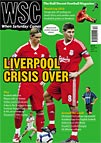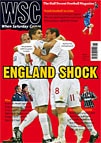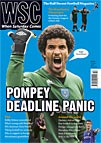 Dear WSC
Dear WSC
I read with interest Paul Joyce’s article concerning the rebranding of SSV Markranstadt as RB Leipzig in WSC 273. Only this summer it was rumoured that my club Southampton would be saved from extinction by becoming co-opted into the Red Bull sporting portfolio. While the team colours, fitting snugly with the brand, would not need to change the adding of the Red Bull moniker seemed a step too far. Surely something would be lost in fusing a global brand, with all its focus-grouped values and marketing spin, to a football club; an act of historic vandalism similar to replacing stained glass windows in a church with double glazing while nailing a satellite dish to the spire. The internet debate suggested, however, that many Saints supporters were happy to trade naming rights in exchange for the club’s survival. The same supporters had several years previously reacted angrily against a corporate branding of St Mary’s Stadium as simply the “Friends Provident Stadium” with the ensuing negative publicity resulting in a U-turn with the addition of St Mary’s to the title. Corporate patronage is not as new as we would like to imagine. The P in PSV Eindhoven stands for Philips, as in the Dutch electrical giants, with the club’s home games at the Philips Stadion. Indeed, many clubs have benefited from long-term relationships with business which may be far preferable to other ownership and financing options; a quick glance around the leagues reveals several fates far worse than “Red Bull Saints”. Football may be just a game to some but following our team is about being part of a community, feeling a connection with the friends and strangers stood next to us at the ground. It is a thread linking us to people looking out for the score on a TV screen or in a newspaper on the other side of the world. Brands by their nature seek to harness and transform these feelings to translate them into profit, in the process sullying the very spirit of our club. Barcelona’s motto is “more than a club”. Every clubs motto should be “more than a brand”.
Neil Cotton, Southampton
Search: 'World Cup 1982'
Stories
Ian Plenderleith wonders why World Cup qualifcation is assumed to take precedence over politics in some countries
Now that Honduras have qualified for the World Cup their people can expect to be the beneficiaries of the usual condescending, quadrennial interest that western sports journalists pay all poor nations who qualify for the tournament. Curtly researched columns and reports from now until June will sagely conclude that life is tough for the majority, but football offers a way out of poverty for a lucky, talented few. For the fans, we will be told, football is an escape from reality, dangling hope and maybe even salvation. For the political leaders, it’s the chance to stoke up patriotism and distract from the country’s real problems. Because people in faraway countries are easily duped into forgetting a life of hardship when faced instead with the possibility of winning a football match.
 The digits on the back of footballers' shirts seem to be getting higher and higher. Seb Patrick examines a recent trend
The digits on the back of footballers' shirts seem to be getting higher and higher. Seb Patrick examines a recent trend
Australia’s Asian Cup qualifier against Kuwait in March of this year drew attention for a number of reasons – namely that the side was made up entirely of A-League players and that it slumped to a shock 1-0 defeat. To the eye of someone with an interest in shirt numbers, however, the game was notable in an entirely different way – as starting winger Daniel Mullen and substitutes Fabian Barbiero and Mitch Nichols took to the field sporting three-digit numbers on their backs.
 Paul Joyce looks back at Lucerne's Nationalliga A triumph, their sole league title to date
Paul Joyce looks back at Lucerne's Nationalliga A triumph, their sole league title to date
The long-term significance
In 1987, the Nationalliga A was reduced from 16 to 12 clubs and the season was split into two parts. After a pre-Christmas “qualifying round”, points were halved and carried forward into a “final round” contested by the top eight clubs. As their budgets increased, Swiss clubs were able to attract young overseas talent and also ageing stars, such as Marco Tardelli, who looked forward to playing the “stress-free football” that Karl-Heinz Rummenigge was enjoying at Servette. By 1989, 46 per cent of players in the NLA were foreigners. These changes made the league harder to predict. Neuchâtel Xamax won their only two championships in 1987 and 1988, and FC Lucerne’s sole league title followed in 1989.
 Al Needham remembers a time when foreign clubs, footballers and national sides were a complete – and enjoyable ‘ mystery
Al Needham remembers a time when foreign clubs, footballers and national sides were a complete – and enjoyable ‘ mystery
We live in a world where (barring the news, and even only every now and again) we are devoid of surprises. We hear singles on the radio months before they’re released, which go straight to No 1 and immediately fizzle down the charts. We download films and American TV shows half a year before they come out over here. By the time a video-game comes out, anyone remotely interested in it knows what it looks like, how it sounds, what you have to do in the final level and how to cheat at it.